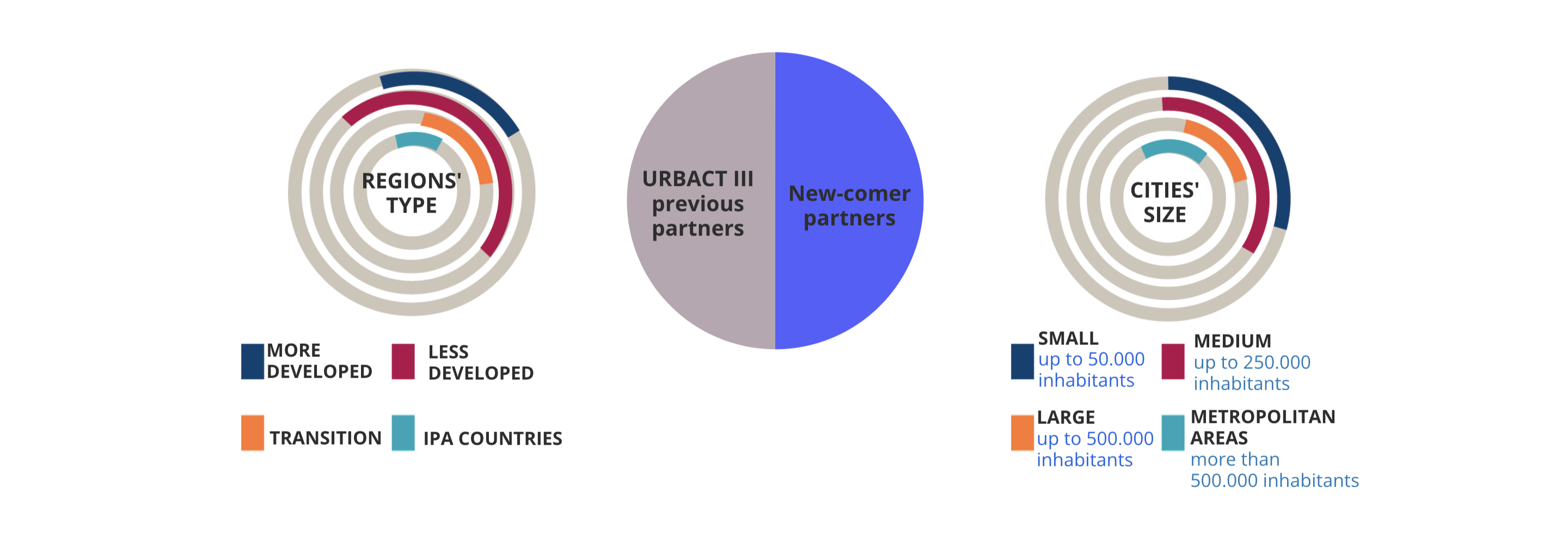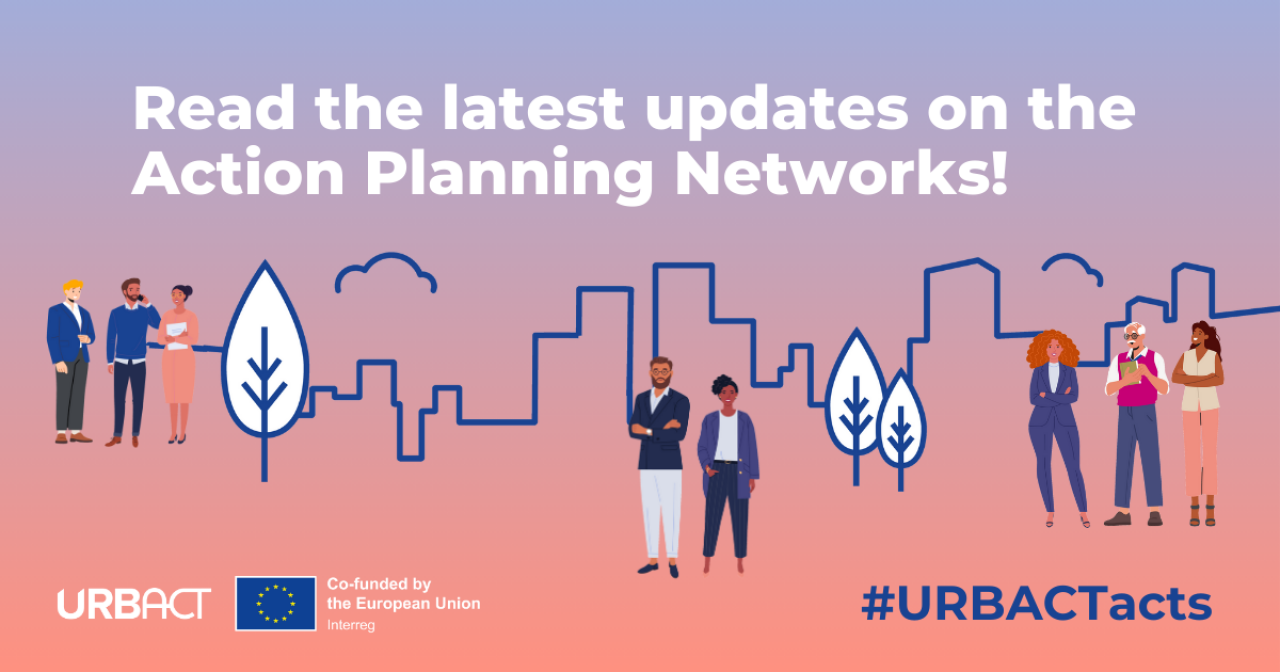Networks in numbers
From 1 June 2023 to 31 December 2025, 252 individual partners from 28 European countries have embarked on 30 Action Planning Networks (APN), under the URBACT IV programme. Within their URBACT journey, they aim to build their knowledge and skills to co-design and develop long-term Integrated Action Plans (IAP) to tackle their local challenges. These plans will define the actions to be implemented, covering timings, responsibilities, costings, funding sources, monitoring indicators and risk assessments.
Each network is composed of a Lead Partner and another 8-10 project partners. Among the 252 partners, half are newcomers to the programme while the other half already has experience with URBACT III (2014-2020).

Networks approved by the URBACT IV Monitoring Committee. Source: URBACT
All the approved URBACT Action Planning Networks (2023-2025) are aligned with the EU Cohesion Policy and will contribute to its five specific Policy Objectives (POs): PO1 A more competitive and smarter Europe; PO2 A greener Europe; PO3 A more connected Europe; PO4 A more social and inclusive Europe; and PO5 A Europe closer to citizens.
Beyond their geographic diversity, the 30 networks also stand out for their wide variety of topics. The URBACT method, which all networks follow, ensures that an integrated approach is applied; stated simply, regardless of the topic, the social, economic, environmental and territorial aspects are considered.
To help you navigate the list, we have clustered them here by their main thematic areas: Participative governance; Urban planning; Local development; Climate action; and Social cohesion.
Participative governance
Networks under the participative governance thematic focus on a wide variety of topics, including citizen engagement, health, localising the Sustainable Development Goals and much more.
Led by Genk (BE), Agents of Co-Existence fosters innovative approaches to societal challenges and strives for inclusive local policies with active community involvement by strengthening the skills and competences of civil servants and creating new organisational structures and cultures.
Developing locally-adapted governance processes is the main objective of Cities for Sustainability Governance, with Espoo (FI) as the Lead Partner, but specifically by using UN Sustainable Development Goals (SDGs) as a strategic vehicle.
From the heart of Paris (FR), the European cities involved in CITIES@HEART work towards a balanced and inclusive city centre for all users, reversing the loss of attractiveness for cities of different sizes and backgrounds.
The One Health 4 Cities network, guided by Lyon (FR), aims to promote the integration of the One Health approach into urban strategies and projects, developing tools that empower decision-makers and operational teams to increase the positive impact of urban projects on the well-being and health of people, animals and the environment.
Urban planning
Urban planning networks address a range of hot topics such as mobility, accessibility, sustainability, public spaces, spatial linkages and territorial cohesion.
PUMA (Planning Urban Mobility Actions) helps cities such as Liepaja (LV), its Lead Partner, develop integrated mobility action plans in order to achieve climate-neutral and sustainable mobility in small and medium-sized cities. It is people-centric, prioritising the needs and well-being of individuals.
The S.M.ALL network is all about “Sharing urban solutions towards accessible, sustainable mobility for all.” Led by Ferrara (IT), they navigate the complexity of two URBACT mobility paradigms: inclusivity and sustainability.
Romagna Faentina (IT) is at the forefront of ECONNECTING - Greener & closer communities, a network that focuses on sustainable urban-rural mobility solutions within the 30-minute territory, designing and implementing proximity strategies for rural-urban functional areas.
SCHOOLHOODS puts children’s health and safety on the menu of a safe, green and happy way to school. Led by Rethymno (EL), the cities belonging to this URBACT network work hand-in-hand with pupils, parents and teachers to co-create solutions allowing pupils to actively go to school on their own.
From Balbriggan (IE) to the borders of Europe, the main goal of the EcoCore network is to accelerate the green transition especially in the work environments of the industrial areas of the partner cities, which are transitioning to low-carbon energy sources for transportation, heating and electricity.
In a mission to connect urban-rural communities, Creacció Agència d'Emprenedoria of Vic (ES) is currently leading the Beyond the Urban network, which promotes urban-rural mobility through the testing and implementation of sustainable, accessible and integrated mobility solutions, with a focus on intermodality, multi-level governance, inclusion, gender equality, and digital tools.
Local development
Local economy, territorial marketing and digital transformation are a few of the topics covered by the local development networks.
C4TALENT, whose Lead Partner is Nyíregyháza City with County Rights (HU), pursues the objective of building business & startup friendly environments in cities to lessen the effects of brain drain, attracting and retaining talented young professionals.
After the COVID-19 pandemic accelerated the transformation around how work is organised, Dubrovnik Development Agency (HR) initiated Remote-IT, a network that tackles the new challenges cities are experiencing connected to the future of work by facilitating the remote and hybrid work for thriving cities.
Another Croatian city is leading a local development action planning network. Sibenik (HR) is at the head of Residents of the future, which addresses the issue of urban depopulation within small and medium-sized cities.
With Fundão (PT) as a Lead Partner, METACITY’s main goal is to increase competitiveness of small and medium tech-aware cities, benefiting from the opportunity to enhance service efficiency and citizen satisfaction provided by the metaverse.
NextGen YouthWork, headed by Eindhoven (NL), is also contributing to the digital transformation, by going one step further and improving online youth work through innovative digital solutions at the city level.
Boosting no-tech and digital local communities, facing specific challenges in terms of diversity, gender equality and inclusion, is the objective of TechDiversity, a network composed of small and medium-sized European cities and guided by Trikala (EL).
Led by Mollet del Vallès (ES), DIGI-INCLUSION also promotes inclusion through digital tools, tackling social exclusion and boosting digital inclusion not only by granting access to technology but by enabling people to develop the necessary skills and to become sufficiently empowered to take full advantage of the opportunities offered by the digital world.
Life in cities continues even after dark. This is the main statement of the network Cities After Dark. Led by Braga (PT), this network promotes the 'Night Economy', through activities that are essential for a city to function 24 hours a day and play a significant role in the global economy.
Climate action
Climate action networks tackle several concerns; green transition, circular economy, green funding and reconversion of spaces, among other subjects.
The COPE (Coherent Place-based Climate Action) network, driven by Copenhagen (DK), unlocks the green potentials of citizen action through a place-based approach, recognising citizens and local action groups as fundamental stakeholders working to accelerate the green transition.
Led by Munich (DE), LET'S GO CIRCULAR! cities focus on the circular transition of cities. This network addresses all issues relevant to a holistic strategy of circular city ecosystems, fostering innovative solutions.
The BiodiverCity partners, with the support of Dunaújváros (HU) as Lead Partner, support and enable communities to plan powerful, nature-based solutions, foster pro-environmental citizen behaviours and draft Urban Greening Plans, contributing to the achievement of the EU Biodiversity Strategy.
In4Green is a collaborative network of industrial cities, headed by Avilés (ES), with a shared commitment: to implement the green transition in industrial areas/cities while remaining competitive and inclusive.
Restoring “forgotten” urban areas into valuable places for and with residents is the mission of GreenPlace. This Wroclaw-led (PL) network aims to restore urban spaces and make them friendly to both the residents and the environment, by optimising the use of existing resources in the context of ecological crisis, the financial and geopolitical situation.
Social cohesion
A variety of topics are addressed by the social cohesion thematic networks, from urban regeneration and place-making to gender, equality, diversity and inclusion.
Under the leadership of Clermont Auvergne Métropole (FR), the objective of FEMACT-Cities is to support the drafting of eight “Local Action Plans on Gender Equality” about the main challenges regarding women's liberty and empowerment, through protection, education, emancipation and economic autonomy.
GenProcure also addresses gender equality, focusing on Gender-Responsive Public Procurement, and it is headed by Vila Nova de Famalicão (PT). This network promotes gender equality through working purchases, supplies and services in the public sector.
Re-Gen is a European network of cities led by Verona (IT) that aims to support sustainable urban development and social inclusion thanks to the protagonism of secondary school students, aged between 10 and 18, from disadvantaged backgrounds.
The Cinisello Balsamo-led (IT) U.R. Impact prioritises social impact in urban regeneration, ensuring social inclusion and community development during urban renewal. They place citizens and their social, economic and environmental well-being at the centre of the processes.
The main goal of Breaking Isolation, a network driven by Agen (FR) that fights against isolation by creating social bonds and links between young and elderly and promoting social diversity.
In order to build more inclusive and resilient societies, WELDI empowers local authorities for a dignified integration of newly arrived migrants. In achieving this objective, cities of this network, led by Utrecht (NL), collaborate with migrants and other residents, as well as with local, national and international partners.
ARCHETHICS network brings together European cities that share the presence of heritage linked to a complex and controversial historical past (totalitarian regimes, contentious borders, etc), such as its Lead Partner Cesena (IT). Their goal is to transform the heritage into places for locals and visitors to share knowledge and come to multi-perspective understandings of the past and new visions for the future.
Follow the network journey
This is just a snapshot of the URBACT Action Planning Networks, but stay tuned for more insights from the Lead Experts and partner cities, themselves! You can also follow the journey of these networks on their project pages and social media, benefit from the lessons learned and try them in your own city.


